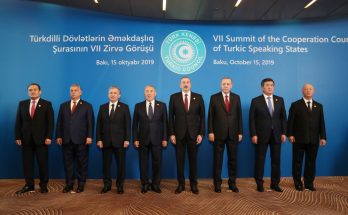
OSCE Minsk Group’s U.S. Co-chair should become better familiarized with the Minsk Group’s documents, learn and study them, and only then go deeper into polemics, Azerbaijani Deputy Foreign Minister Araz Azimov told journalists.
Azimov made the remarks on April 10 expressing his attitude to the comments by the OSCE Minsk Group’s U.S. Co-chair, James Warlick who said on his Twitter that Nagorno-Karabakh conflict is a conflict between “Nagorno-Karabakh and Azerbaijan”.
Deputy FM said a political bias can be seen in such statements. Azimov also stressed that Warlick made this statement to calm down Armenia, as this country tries to present the Nagorno-Karabakh as a “government”.
Azimov underscored that they [the separatist regime] is wrong to think that if they are recognized as one of the conflict sides, they will be invited to sign an agreement with regard to settlement of the conflict at the next step.
He said it is clear that Azerbaijan and Armenia are the conflict sides. And the residence of an ethnic group of 30,000 people on any territory does not give it the rights and grounds to claim that territory as its own.
Azimov also stressed that Azerbaijan has always expressed and confirmed its intention to retain the Azerbaijani citizenship of the Armenian population living in Nagorno-Karabakh.
He said there are certain steps in the settlement of the conflict.
The deputy minister underscored that at this stage of occupation the Armenian armed forces should leave the Azerbaijani lands, and to this end Azerbaijan is negotiating with the Armenian side.
Coming back to the Tweets of James Warlick, Azimov said that they can’t be taken seriously.
He said Warlick, as an OSCE Minsk Group Co-chair, should be well acquainted with the Minsk Group’s mandate, according to which the members of Nagorno-Karabakh’s population should participate in negotiations as an interested party, and this applies to both Azerbaijanis and Armenians.
“Azerbaijan has never deviated away from this format,” he added.
Azimov also said that at the next step of settlement of this conflict, following the end of the occupation, talks will be held with the participation of Nagorno-Karabakh’s population – Azerbaijanis and Armenians in order to settle the dispute.
The conflict between the two South Caucasus countries began in 1988 when Armenia made territorial claims against Azerbaijan. As a result of the ensuing war, in 1992 Armenian armed forces occupied 20 percent of Azerbaijan, including the Nagorno-Karabakh region and seven surrounding districts.
The two countries signed a ceasefire agreement in 1994. The co-chairs of the OSCE Minsk Group, Russia, France and the U.S. are currently holding peace negotiations.
Armenia has not yet implemented the U.N. Security Council’s four resolutions on the liberation of the Nagorno-Karabakh and the surrounding regions.
/Trend/




